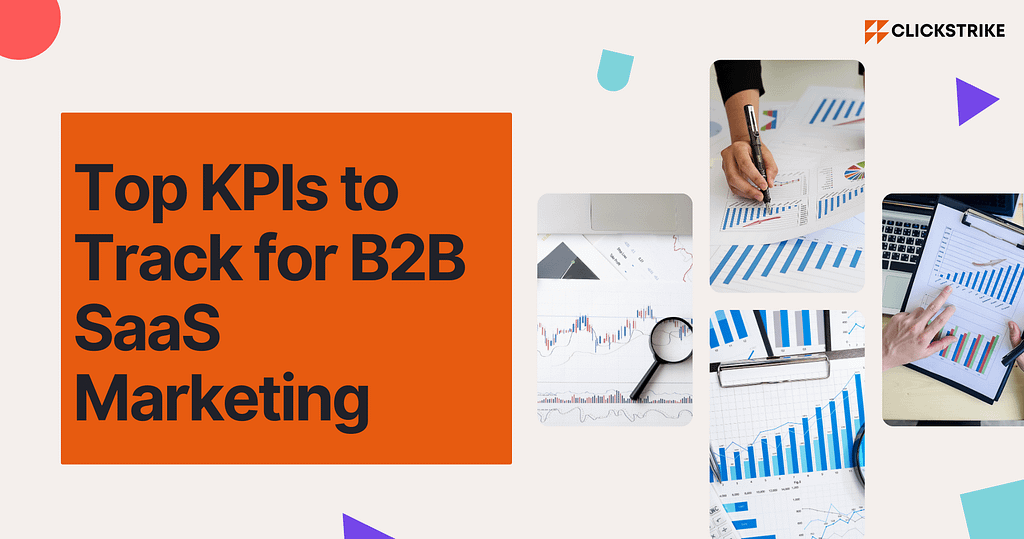In the rapidly evolving world of B2B SaaS marketing, keeping a close eye on key performance indicators (KPIs) is essential for measuring success and making data-driven decisions.
KPIs provide valuable insights into the effectiveness of marketing strategies, enabling businesses to optimize their efforts, enhance customer acquisition, and drive revenue growth.
As a B2B SaaS marketing agency, we constantly have to keep an eye on these important numbers to ensure we’re delivering solid growth to clients.
In this blog post, we will explore the concept of KPIs, explain their importance, and break down the top KPIs for B2B SaaS marketers to track.
What is a KPI?
Before we dive into the specific KPIs for B2B SaaS marketing, it’s important to understand what KPIs are and why they matter. Key Performance Indicators are measurable values that reflect the performance of specific business objectives.
These objectives can vary based on business goals, but in the context of marketing a B2B SaaS product, they typically revolve around customer acquisition, engagement, and revenue generation.
Why are marketing KPIs important?
KPIs serve as benchmarks that provide insights into the progress towards achieving these objectives. By monitoring KPIs, marketers can identify areas of improvement, evaluate the effectiveness of marketing campaigns, and adjust strategies accordingly. They provide a quantitative measure of success, enabling marketers to make informed decisions based on data rather than assumptions.
The Top KPIs to Track for B2B SaaS Marketing
Customer Acquisition Cost (CAC)
CAC measures the cost incurred to acquire a new customer. It takes into account various marketing expenses, such as advertising, sales commissions, and marketing campaigns, divided by the number of customers acquired within a specific time frame.
Why is tracking CAC important?
Tracking CAC helps assess the efficiency of marketing spend and allows for effective budget allocation.
Customer Lifetime Value (CLTV)
CLTV represents the total revenue a customer generates throughout their entire relationship with a company. This metric helps determine the long-term profitability of customer relationships and enables businesses to focus on acquiring customers with high CLTV.
By understanding the CLTV, marketers can allocate resources to retain existing customers and identify opportunities for upselling or cross-selling.
Conversion Rate
What does Conversion Rate mean?
Conversion rate measures the percentage of website visitors who take a desired action, such as signing up for a free trial, requesting a demo, or making a purchase. Tracking the conversion rate helps marketers evaluate the effectiveness of their website, landing pages, and overall user experience.
Why is Conversion Rate Important?
By optimizing conversion rates, marketers can maximize the return on their marketing efforts.
Churn Rate
What does Churn Rate mean?
Churn rate represents the percentage of customers who discontinue using a product or service within a specific period. For B2B SaaS companies, reducing churn is crucial for sustainable growth.
Why does Churn Rate matter?
By tracking churn rate, marketers can identify potential issues, understand customer behavior, and take proactive measures to improve customer satisfaction and retention.
Customer Engagement Metrics
Engagement metrics, such as active users, time spent on the platform, and feature adoption, provide insights into how customers interact with a B2B SaaS product. Tracking these metrics helps marketers understand the product’s stickiness, user satisfaction, and identify areas for improvement. Engaged customers are more likely to become advocates, leading to increased referrals and organic growth.
Return on Investment (ROI)
ROI measures the profitability of marketing campaigns by comparing the revenue generated to the costs incurred. As such, it is one of the most important B2B SaaS marketing KPIs to track.
By tracking ROI, marketers can identify the most effective marketing channels, campaigns, and messaging. This allows for better resource allocation, optimization of marketing strategies, and increased overall profitability.
Customer Satisfaction (CSAT) and Net Promoter Score (NPS)
CSAT and NPS are crucial metrics for measuring customer satisfaction and loyalty. CSAT measures the satisfaction level of customers with a specific interaction or experience, while NPS measures customer loyalty and the likelihood of recommending the product to others.
By monitoring CSAT and NPS, marketers can gauge customer sentiment, identify areas for improvement, and cultivate a positive brand reputation.
CRMs like HubSpot and Salesforce have tools to measure and benchmark CSAT and NPS.
Wrap Up: Which B2B SaaS Marketing KPIs should you track?
Tracking the right KPIs is vital for successful B2B SaaS marketing. By measuring and analyzing these key metrics, marketers can gain valuable insights into their marketing efforts, identify areas for improvement, and drive growth. Customer acquisition cost, customer lifetime value, conversion rate, churn rate, customer engagement metrics, ROI, CSAT, and NPS are among the top KPIs that provide a comprehensive view of marketing performance and guide data-driven decision-making.
By consistently monitoring and optimizing these KPIs, B2B SaaS marketers can enhance their marketing strategies, improve customer acquisition and retention, and ultimately drive business success.

 Book A Call
Book A Call